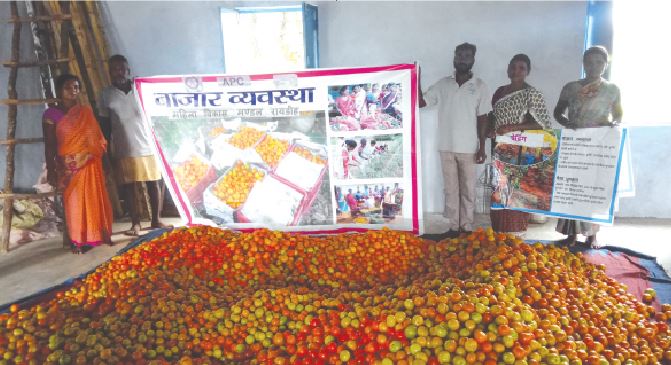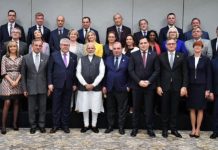About 1,120 women farmers in Gumla district of Jharkhand have come together under a women’s trust to sell their produce and find better markets, writes Deepanwita Gita Niyogi

Smallholder women farmers from 23 villages of Gumla district in Jharkhand have taken to vegetable cultivation under a farmer producer company which was formed in June last year. This is giving them easy access to markets and agricultural inputs as well as ensuring fair prices for their produce.
Apart from Gumla, the initiation of a farmer producer company (FPO) was also carried out in Khunti district of the state, which is 33 km from state capital Ranchi. Both are tribal-dominated districts where farmers often do not get quality seeds and fertilizers. As a
result, they were collectivised and linked to the market. The initiative is being supported by Walmart with technical assistance from Pradan, a non-profit which works with India’s rural communities.
Extra profit
Munni Oraon from Tigra village in Gumla used to cultivate paddy but shifted to the cultivation of vegetables for extra profit. Last year, she earned
22,000 by selling tomatoes only. Oraon informed that she used to cultivate marua (millet), paddy and urad. “I used to grow veggies only for household consumption and not for sale at all. But then I thought things over, deposited 12,000 in the trust and formally joined it. I handed over 1,500 kg of tomatoes to the mahila trust last year and also sold 500 kg worth 10,000 in the local market,” she said. Oraon, whose family consists of six members informed, that many smallholder farmers faced difficulties due to the pandemic situation. The farmer pointed out that many of us did not know where to sell our produce. But after joining the trust farmers have started getting a lot of benefits like easy labour and fertilisers. Most farmers are cultivating tomatoes, cabbages, cauliflowers and peas in Gumla.
Priska Bara from Khora Jamtoli village owns three acres of land, of which 60 decimals is being used for growing vegetables. Last year, she handed over 1,280 kg of tomatoes to the trust and sold 400 kg all by herself. “The price stood at 20-30 per kg for tomatoes. We could not even dream of growing veggies earlier but things have changed for the better,” she said.
Saroj Devi from Jungatoli village has a total of 90 decimals of land and on 30 decimals she cultivated tomatoes. “I grew tomatoes before monsoon last year and it was ready by September. After that I cultivated peas, cabbages and cauliflowers. Most farmers in the trust are women and there are a few men as well. We used to have problems but being in the trust is helpful,” she said. Devi was not sure if her produce would find a ready market during the COVID-19 pandemic. But she earned 23,000 as she is a member of the FPO named the Gumla Mahila Kisan Swavlamban Trust. Pradan staff working on the ground said that the women are clearly reaping benefits. When they wanted to start vegetable cultivation for sale, the FPO model was explained to them. Slowly, it is being hoped that the number of women will increase. Area manager Dilwan Barla said all the women in the FPO are farmers and they run the trust. Some of them are also board members. Lalita Devi, a woman farmer from Silambar Toli village in Raidih block of Gumla, is a board member. There are nine board members in total who run the trust and manage its daily affairs.
“We are following all the right methods and have been trained well to grow vegetables the right way for maximum production. All of us now possess adequate knowledge about the right amount of fertilisers to use and the preparation of beds before cultivation. Women are growing tomatoes and other vegetables. The aim is to find easy access to markets for them outside the district. We find it easy to sell our produce as all of us grow the same varieties. Farmers have to hand over 1,000 kg of peas to the trust, 1,650 kg of cabbages and cauliflowers and 1,850 of tomatoes.”
Aggregation
Principal scientist at CIMMYT ML Jat said that the FPO concept is sound and certainly gives farmers timely access to inputs. GV Ramanjaneyulu of the Centre for Sustainable Agriculture based in Hyderabad said that FPOs are ultimately cooperatives and they accept memberships. “Women are trained to take up businesses which help them earn additional income. Individual selling and buying is a costly affair. So, even big farmers are getting into cooperatives. Though new-age FPOs are doing better, they are also getting into the hands of corporate companies. However, aggregating produce can ultimately help farmers. India has a long history of cooperatives,” Ramanjaneyulu added. Rajeev Ranjan, who is in charge of the farm-based livelihood vertical at Pradan, explained that in remote areas of Jharkhand, farmers face great difficulty in getting quality inputs. Also, most areas are rain-fed with low irrigation facilities and migration is high.
So, collectivising farmers helped as smallholders need inputs in limited quantities as their lands are small in size. He added that crops which require minimal labour and can grow without irrigation were chosen as these are most suitable for smallholders. The problem is that most farmers on Jharkhand also focus on paddy which is labour intensive during monsoon and do not pay much attention to vegetables. But with the initiation of the FPO, things are turning around.
tehelkaletters@gmail.com











